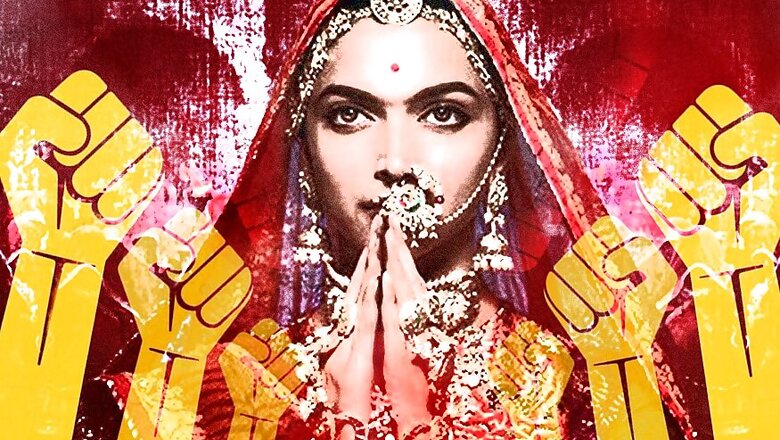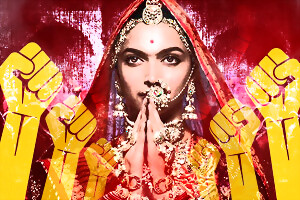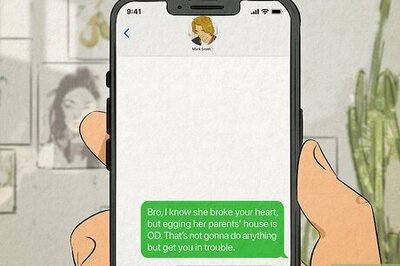
views
If Karan Johar’s video stating at gun-point that he’ll not engage with Pakistani artistes disturbed cine-buffs, Sanjay Leela Bhansali’s full-page disclaimer advertisement explaining what his film is about will leave them perplexed. It was MNS then, it’s Shri Rajput Karni Sena today.
Back in 2017 when hooligans of Karni Sena, a Rajput fringe outfit, assaulted filmmaker Bhansali on the set of his then-underway film Padmavati, one perhaps didn’t tap its full potential of being a reflection of the current state of art in India. Or its potential to disrupt the democratic freedom of artists in India.
Cut to 2018, the makers of the film starring Deepika Padukone, Ranveer Singh and Shahid Kapoor, finally have a go-ahead from the Central Board of Certification (CBFC) and almost all state governments barring Gujarat, Madhya Pradesh, Rajasthan and Haryana (so far). But the green light comes with a price and it’s more than dropping of its ‘I’ and adding an extra ‘a’, which the makers made clear by posting full-page “disclaimer" advertisements on the front pages of several newspapers.

Coming just a day after Viacom18 Motion Pictures and Bhansali productions announced the release date of January 25, here are the main points mentioned in the ad.
* The film 'Padmaavat' is based on the epic 'Padmavat' by Sufi poet Malik Muhammad Jayasi which is a revered work of fiction. * The film does not have and never had a dream sequence between Alauddin Khilji and Rani Padmavati.
*We have made this film as an ode to the famed valour, legacy and courage of Rajputs.
*The film portrays Rani Padmavati with utmost respect and does not tarnish her repute or misrepresent her character in any manner.
*The film has been cleared with only five modifications by the CBFC and is officially approved for release in India with a U/A certificate.
*There are no further cuts or modifications to the film.
"Padmaavat is a film that every Indian will be proud of. Please visit your nearest theatre on January 25 to experience it yourself," reads the last line.
Statutory warning on a cigarette pack, I understand. This, I don't. No place for art in my country.#Padmaavat pic.twitter.com/dazvLQ4ffu— Nakuul Mehta (@NakuulMehta) January 15, 2018
The points, however, feel like apologies to all that has offended the self-proclaimed moral police and an explanation of all that the film is not. Amid Karni Sena’s far-fetched political ambitions and a strong fear of disruption of state order, the respect and freedom for art has gone for a toss. Otherwise, who would have thought that one of the highest paid female actors in India will be termed as a “naachnewaali"? Or a film based on a fictional character would lead to a bounty of 10 crores on Deepika and Bhansali’s nose, ears and or head? Or that an actual person will die in the wake of miring controversies? Or that the fringe outfits will threaten with the announcement of female members of Kshatriya community performing jauhar (self-immolation) in Chhitorgarh?
And it’s time one calls out Karni Sena for their bluff. I, for one, think they don’t care if the film is based on a work of fiction or a real life incident or happens to be a Star Wars: The Last Jedi spin-off; they just needed a reason for vandalism and they found one. Not just freedom of art but also an essential need of coherent logic for staging protests has gone for a toss in the recent past. Why else would men, who claim to be protecting a woman’s honor, fictional in this case, hurl abuses at another woman or be ready to sacrifice the lives of hundreds of their women? Why else would they take to the streets and incite violence instead of taking the peaceful legal route? Why else would they ignore Bhansali’s repeated clarifications that there’s “no dream sequence between Rani Padmavati and Allaudin Khilji"? Why else would they not give a chance to the makers to show their work and then reach to a conclusion?
Even the most avid moviegoers don't trust Bollywood to stay true to historical facts and are aware of the several creative liberties the makers and producers take while helming a period drama. Despite that, Bhansali’s magnificent work wouldn't have shown Rajput culture in as bad a light as Karni Sena’s recent actions have and when this film releases, which it shall, all pride will go in vain. Because one doesn’t intend to save the pride of a fictional woman, who may or not may not have existed, by disrupting the peace and law and order of several states, inciting violence, issuing bizarre threats or/and provoking women of their own culture to commit suicide. But one does, in my opinion, pose a threat to our national security by resorting to the above-mentioned means under the flag name of demonstrations against “distortion of historical facts".
And a fun fact: While Karni Sena is on the streets protecting the dignity of a fictional queen, their state (Rajasthan) ranked last in female literacy out of all states in India as per Census 2011. If even half of the energy that’s been spent in evoking a ban on the film release was consumed in the right direction or for the right causes, the situation would have been better today.
Let's take Padmaavat for what it is- a work of art that'll release on a certain Friday and will be judged on parameters that include acting, direction and technical finesse among other filmmaking aspects. You may like it or loathe it, but it really would be just that- a film, neither a life-threatening disorder nor an emergency-evoking situation and definitely not a community validation stamp.
















Comments
0 comment